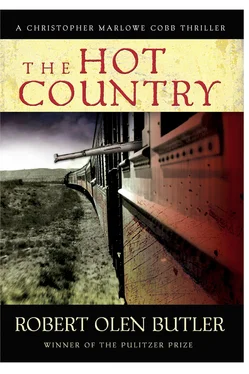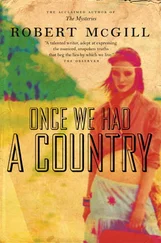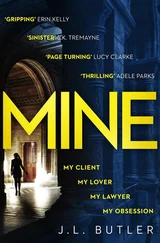And the bellowing voice bellowed some more. In English. “Jesus H. Christ! I know you!”
And leaping off his horse in black shirt and black sombrero and bandolera and striding toward me was Tallahassee Slim.
I stood up straight and stepped away from my crumpled Villista and squared around to face Slim.
If his brown eyes seemed, upon my first meeting in Corpus Christi, to be the color of mountain-lion shit, they were now the eyes of the critter itself. Cool and ravenous. And he gave off not even a first-glance impression of gaunt anymore, unless you’d call a steel cable on the Brooklyn Bridge gaunt.
We clearly both had the notion to shake hands, but given the context, we also both thought the better of it for the time being.
“What the hell are you doing out here?” he said, lowering his voice, acknowledging our little bond, but speaking Spanish. There was no doubt that everyone knew he was an American, but soldiers of fortune had no fixed nationality. Slim was smart. He was doing this for me. He knew I couldn’t have gotten this far on a train as an American.
“I’m after a story,” I said.
“What the hell have you done to my man?” he said.
My Villista was now on all fours, making vaguely sexual-sounding, feminine sounds.
“Kicked him in the nuts. He was about to shoot me.”
Which reminded Slim of the body he had just ridden past. He glanced at it. “What the hell has my man done to this one?”
Slim and I both knew that was a rhetorical question.
I said nothing.
Slim shrugged. “I’m sure he deserved it.”
“Who am I to judge?” I said.
“Are you trying to get to my boss?”
“Villa?” I asked, also rhetorically.
“Villa,” he said anyway.
“Yes.”
Slim nodded. “Wait here. I’ve got something to deal with.”
Slim jumped back up on his horse and shot his Mauser twice in the air, paused for a beat, and then shot once more. All the Villistas stopped what they were doing and turned his way. He clearly was, as I’d assumed, in charge. “ Compañeros! ” he cried. He had the pipes-power of Caruso. “Work quickly now and do not damage the train!”
And he nudged his horse forward. I thought he was going to say something to me, but he looked past my shoulder, at the ground. I turned to see. The man I’d put down was sitting now, clutching his crotch, looking very unhappy.
“Hernando,” Slim said sharply. My Villista looked up. Slim said, “Do nothing to this man. Is that clear?”
Hernando lowered his head and cursed softly.
Slim spurred his horse along.
I looked to the right, past the first-class passengers, who were still in the process of being robbed, and I did not see Mensinger. I was daring to hope Slim would take me with him. If I could get to Villa without trying to follow Mensinger out of La Mancha, that would be very good. But it took a moment to absorb Mensinger’s absence and I thought: This was why Slim had hurried his boys along and wouldn’t burn the train. He knew who the German was, knew he was expected. I’m sure Slim offered Mensinger what I thought he would offer me, to ride with the train-tax company to Villa’s camp. Would Mensinger take him up on it? Would he let himself become a protectorate of a gang of bandits, even if they were under Villa’s command? Or if I was right about his reasons for getting off in La Mancha, would he excuse himself with Slim — whom he did not expect and may not trust — and stick to his own plan? Would he insist on making his entrance on his own terms?
And who was I, either way?
Soon Slim rode back to me, leading a chestnut stallion saddled up with an empty rifle holster and bags. He motioned me over and I knew we needed to say more private words. I moved to him and I stood in his shadow and looked up.
He was still speaking Spanish, but low. “Who were you pretending to be in order to get here?”
“A German.”
Slim nodded very faintly. “Interesting. Got another German on board.”
“To him I was a Canadian.”
Slim laughed. “Canadian newsman?”
“Coffee merchant.”
“You ready to go back to what you really are?”
I didn’t answer instantly, but I didn’t hesitate more than one slow blink of the eye, and Slim jumped in: “If you want some kind of story, you pretty much have to.”
“Will that work?”
And Slim was speaking English now, though still low enough for just the two of us. “Don’t know. He likes his publicity. No doubt about that. But he blows hot and cold. And I’m the only American fighting for him that he hasn’t sent packing. If I bring you in, I’ll know as soon as I look in his eyes. If he’s in the wrong mood, I’ll have to make like you’re my prisoner. Which, I have to tell you, is what you’ll be.”
“Fair enough,” I said.
“Mount up,” he said. “Courtesy of one of the last stubborn hacendados around these parts. Put your stuff in the saddlebags.”
He handed me the reins. “I’ll be back for you as soon as we finish with our tax collection.” And he rode off.
I moved to the chestnut, who shook his head at me but let me stroke his muzzle. I leaned near him and exhaled heavily into his nostrils, just to introduce myself. He dipped his head and muttered a little and I knew we’d be all right.
Repacking was tough. Fortunately, the saddlebags were big, and though I had to lose its nifty carrying case, I was able to squeeze in my Corona. Sadly, though, volume XVI of the Scribner’s monogrammed New York Edition of Henry James simply could not fit and would have to be abandoned a long, long way from Washington Square. About as far away as I was feeling at the moment from Michigan Avenue.
We rode hard into the plateau, into the mesquite and the greasewood, racing against the fading of the daylight into twilight, the mountains going black against the sky. We were trying, it seemed, to get somewhere specific, and to keep up I was soon riding like the Mexicans, with stiff legs and constantly flapping them to urge my horse on. There were no sounds but our hooves and all of us panting, horses and men alike. The night threatened — the moon had not yet risen — and though we still could see around us, it was clear that we soon would be blind.
So we rode even harder and then someone yipped. Perhaps a mile ahead we could see the yellow smoke of evening fires and now we were on a dusty road, and a stone fence was running with us. We were in the lands of a sizeable hacienda, the dueño long since fled or dead. Slim and his boys all seemed not to be seriously wary here. I took the place to be their staging area for raids on the trains.
At a half mile from the fires, someone among us shot two quick rifle rounds. Shortly, from up ahead, came one Mauser reply, a beat, and then a second. And soon we all arrived through a man-high stretch of the stone wall, a wide, iron-gated portal guarded by half a dozen more Villistas, and we slowed for another few hundred yards up a desert rise to the casa grande.
It was dark now, but as I climbed down from my horse, a little shaky and aching from the ride, I sensed off to the west and below us the vastness of the plateau. And the casa was grande indeed, porticoed like the city hotels, one-storied but high-roofed, built around a courtyard large enough to set a wealthy Veracruzano ’s house fully inside.
We ate in one of the casa ’s lofty salas , stripped of its furnishings, only a tattered brocade on one wall — custom-made with cattle and mountain peaks, images of this very ranch no doubt — and an empty mahogany sideboard on another. There were women shuttling in and out to serve Slim and me and his core group lounging on the floor and other women serving the rest of the men in the courtyard. I didn’t know if these were peon women left to make a life in their adobe huts on the ranch after the owner had gone or if they were the mated women of the Villistas , though from what I saw of this culture, from the perspective of any low-bred and poor Mexican woman, there was little difference: She existed to do this, to cook and feed and give sex and whatever comfort she could to whatever men claimed her.
Читать дальше












